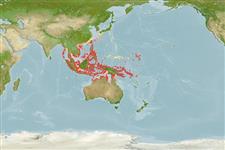Teleostei (teleosts) >
Eupercaria/misc (Various families in series Eupercaria) >
Nemipteridae (Threadfin breams, Whiptail breams)
Etymology: Scolopsis: Name from the Greek masculine noun 'skolos' meaning 'thorn' and suffix '-opsis' (from Greek feminine n. 'opsis' meaning 'aspect', 'appearance') meaning ‘thorny appearance’ presumably referring to 'les dentelures de la préopercule, en ont aussi, et même d'épineuses, aux sous-orbitaires' mentioned by Cuvier (1814) in his designation of the genus. Name ending in -'opsis' are treated as feminine according to ICZN 1999: Article 30.1.2 (Ref. 130620).
More on author: Lacepède.
Environment: milieu / climate zone / depth range / distribution range
Ecology
Marine; brackish; reef-associated; depth range 2 - 25 m (Ref. 90102). Tropical; 33°N - 16°S, 90°E - 170°E (Ref. 3810)
Indo-West Pacific: Andaman Sea, Ryukyu Islands, Philippines, Indonesia, Solomon Islands and Vanuatu.
Size / Weight / Age
Maturity: Lm ? range ? - ? cm
Max length : 25.0 cm TL male/unsexed; (Ref. 90102); common length : 10.0 cm SL male/unsexed; (Ref. 3810)
Dorsal spines (total): 10; Dorsal soft rays (total): 8 - 9; Anal spines: 3; Anal soft rays: 7 - 8; Vertebrae: 24. Body is olive above and white below, with a silvery-white stripe on the back beneath the dorsal fin. A row of golden yellow spots are on the sides, mid laterally from behind the tip of the pectoral fin to the caudal peduncle. The upper and lower edges of the caudal fins are reddish (Ref. 3810).
Inhabits sandy bottoms close to coral reefs. Also near mangroves (Ref. 48635). Frequently in silty areas with low visibility (Ref. 90102). Occurs often in small groups. Feeds on benthic invertebrates and small fishes.
Life cycle and mating behavior
Maturity | Reproduction | Spawning | Eggs | Fecundity | Larvae
Russell, B.C., 1990. FAO Species Catalogue. Vol. 12. Nemipterid fishes of the world. (Threadfin breams, whiptail breams, monocle breams, dwarf monocle breams, and coral breams). Family Nemipteridae. An annotated and illustrated catalogue of nemipterid species known to date. FAO Fish. Synop. 125(12):149p. Rome: FAO. (Ref. 3810)
IUCN Red List Status (Ref. 130435: Version 2024-1)
Threat to humans
Harmless
Human uses
Fisheries: subsistence fisheries
Tools
Special reports
Download XML
Internet sources
Estimates based on models
Preferred temperature (Ref.
123201): 26.3 - 29.3, mean 28.8 °C (based on 1970 cells).
Phylogenetic diversity index (Ref.
82804): PD
50 = 0.5000 [Uniqueness, from 0.5 = low to 2.0 = high].
Bayesian length-weight: a=0.01820 (0.01054 - 0.03142), b=3.06 (2.92 - 3.20), in cm total length, based on LWR estimates for this species & Genus-body shape (Ref.
93245).
Trophic level (Ref.
69278): 3.7 ±0.52 se; based on food items.
Resilience (Ref.
120179): High, minimum population doubling time less than 15 months (Preliminary K or Fecundity.).
Fishing Vulnerability (Ref.
59153): Low vulnerability (15 of 100).
Nutrients (Ref.
124155): Calcium = 62 [38, 132] mg/100g; Iron = 0.658 [0.316, 1.447] mg/100g; Protein = 19.4 [17.4, 21.1] %; Omega3 = 0.16 [0.09, 0.28] g/100g; Selenium = 23.7 [13.2, 46.5] μg/100g; VitaminA = 77.5 [20.1, 251.5] μg/100g; Zinc = 1.5 [1.0, 2.2] mg/100g (wet weight);
